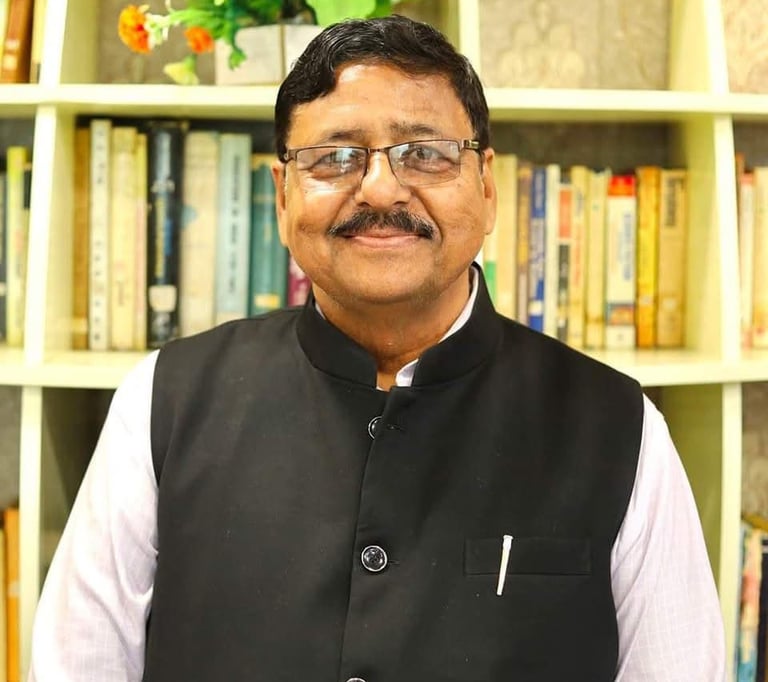Maharaja Agrasen: The Eternal Monarch of Equality and Harmony – Commemorating Aggarsen Jayanti
Centuries before the welfare state, before sustainable economies, before social democracy, an Indian ruler taught the world that prosperity means nothing without humanity.
Parshant Chohan
9/22/20253 min read


By Surinder Aggarwal, President of Akhil Bhartiya Agrawal Sammelan (Punjab) and a distinguished former Civil Contractor with the Indian Army.
Punjab, India – On the auspicious occasion of Aggarsen Jayanti, communities across India and abroad unite in reverence for Maharaja Agrasen, the legendary monarch, philosopher, and social reformer whose principles of equity, self-reliance, and universal brotherhood continue to shape civilisation even centuries after his reign.
Maharaja Agrasen, hailed as the progenitor of the illustrious Agrawal community, was not merely a sovereign ruler of Agroha but a visionary architect of social justice. His edicts were not inscribed upon lifeless stone tablets but upon the very conscience of society. He established a system where no man, woman, or child would ever endure hunger, deprivation, or indignity. His decree – that every citizen should contribute one brick and one coin to help a new family settle – was not just an act of economic policy but an immortal proclamation of fraternity.
The Philosophy of Agrasen: Governance Beyond Time
Maharaja Agrasen rejected violence and wars of expansion, choosing instead the path of prosperity through trade, industry, and community welfare. His kingdom of Agroha flourished as a bastion of fairness where wealth was not a privilege for the few, but a shared resource for the many. Long before the world would coin words such as “welfare state” and “inclusive economy”, Agrasen had already envisioned a society where justice and compassion were the cornerstones of governance.
What is remarkable, and indeed shocking to modern political discourse, is that Maharaja Agrasen practised a form of proto-democratic socialism in an era when monarchs across the globe thrived on conquest and oppression. Where emperors built empires upon the tears of their subjects, Agrasen raised a civilisation upon their smiles. His rule was not about grandeur of the throne, but the dignity of the people.
The Contemporary Relevance of Aggarsen Jayanti
In an age fractured by economic disparity, social divisions, and relentless pursuit of materialism, the celebration of Aggarsen Jayanti is not a mere ritual but a solemn reminder of values urgently needed today. The principles of Sarvodaya (upliftment of all) that Agrasen espoused resonate deeply with the philosophies later championed by Mahatma Gandhi and social reformers across the world.
Educational institutions, business communities, and social organisations observe this day with discourses, cultural events, and philanthropic initiatives – honouring not only the legacy of Maharaja Agrasen but also renewing the pledge to live by his ideals. In towns and villages, lamps are lit not simply in devotion, but as beacons of equality, signalling that the flame lit by Agrasen centuries ago is still alive.
Aggarsen: The Forgotten Statesman of Global Relevance
While history often glorifies the Alexanders, the Napoleons, and the Caesars, Maharaja Agrasen stands in stark contrast as a monarch who sought no conquest beyond his own heart and conscience. If the world recognised rulers by the magnitude of their humanity rather than the length of their conquests, Agrasen’s name would stand taller than any emperor recorded in Western chronicles.
In truth, Agrasen was not merely an Indian monarch – he was a global statesman before the concept existed. His model of governance echoes in the Scandinavian welfare states, his principle of community support resonates with modern cooperative movements, and his moral economy finds parallels in twenty-first century discourses on sustainable development.
The Unbroken Lineage of Legacy
The Agrawal community, scattered across continents, continues to embody the principles of its great progenitor. Known for integrity in commerce, charity in society, and leadership in public life, the community remains a living monument to the ethos of Agrasen. In countless towns and metropolises, hospitals, schools, orphanages, and community halls bear testimony to the living legacy of his doctrine: prosperity is hollow unless it serves others.
Conclusion: A King Who Lives Forever
Aggarsen Jayanti, therefore, is not merely the celebration of a birth anniversary; it is the reaffirmation of an eternal idea – that true leadership lies not in the crown upon the head but in the conscience within the heart. Maharaja Agrasen’s life challenges every ruler, every businessman, and every citizen to measure success not by accumulation but by distribution, not by dominion but by service, and not by power but by compassion.
As the sun rises on this year’s Aggarsen Jayanti, one cannot help but reflect: while empires of gold and stone have long perished into dust, the empire of equality envisioned by Maharaja Agrasen still reigns supreme in the hearts of millions.
